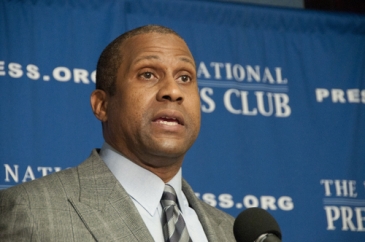Tavis Smiley Fires Back At WBEZ's Malatia Over Smiley & West Cancellation
By Chuck Sudo in News on Oct 16, 2012 2:10PM
Broadcaster Tavis Smiley published an open letter Monday in response to WBEZ’s decision to drop his program with Princeton Professor Cornell West, Smiley & West, from the station’s lineup.
Time Out Chicago’s Robert Feder first reported last week the decision to drop Smiley & West by Chicago Public Media president and CEO Torey Malatia was based on what he believed was the show took more of an advocacy bent and was “becoming like Democracy Now.”
“Our hosts choose material to inspire cross-cultural understanding and civic engagement, strictly operating under the mandate of public service. Even when our function is not a journalistic one, we recognize that appearing to take sides, or to prefer certain voices to others, will erode our value as a meeting place for all. We attempt to do all of this at a level of energy and creative influence that the visionaries of civic agency had written about since radio’s creation.”
Smiley’s open letter pulled few punches.
I was content to simply move on beyond a cancellation decision I vehemently disagreed with, because I respect the public media model that stations know best. That is until I was made privy to the content of your written response to listeners who have been expressing disappointment about the cancellation of Smiley & West on Chicago’s WBEZ 91.5 FM. I must say that the spin found in your letter is beneath you, the station you work for, and moreover the people you serve. Say nothing of the fact that to my knowledge, at no point did you or your staff ever attempt to communicate to me any of the impressions you so freely shared in your letter to listeners.--snip—
I am as “inclusive” as I have ever been because I am as curious as I have ever been. I reject and resent the very suggestion by you in letters to listeners that I do not demonstrate a willingness to “respect and hear opposing views.” IF Smiley &West has experienced any erosion in listenership, it might have something to do with being heard over WBEZ on Sundays at 12 Noon when most Black Chicagoans are in worship service. To so blatantly disregard an obviously critical mass of listeners in the scheduling of this program suggests one and or two things: that you don’t get it or that you don’t care.
(Read Smiley’s full open letter here.)
Both Smiley and Malatia spoke more freely with Sun-Times columnist Laura Washington about the decision. Malatia claimed listener numbers for Smiley & West had dropped significantly and that more recent episodes of the show were “a lot of seat-of-the-pants kind of crap.” Smiley said public radio, and WBEZ, weren’t committed to diversity and didn’t want a program that criticized President Obama. “We are being punished by WBEZ for advocating for the poor. That’s a compliment to us.”
A Facebook page has been created calling for Smiley & West to be put back on the air. One of the page’s fans re-posted an email Malatia wrote her in response to WBEZs decision.
But your suggestion here that one, one hour weekly program that is distributed for sale by Public Radio International—not to mention produced in a studio in Los Angeles, California, 2,000 miles from the community we serve--that this one hour weekly program, now that it is absent from our schedule, deprives our community of public service is an exaggeration to say the least.If that were true, our license should have been revoked long ago for the worthless character of the other 167 hours per week in our schedule.
We serve this community with devotion and, often, brilliance. I state this knowing that no one here would react with self-satisfaction or complacency reading the preceding sentence. We are always aware that we have a long road to travel and much more effort to expend in our public service offerings. We sometimes do not produce material that adds as much value as our community expects nor do we always purchase those programs that are offered for sale as meaningfully as we should for our audience.
So, when it’s clear that people are dissatisfied with a program—whether we produce it or we buy it—and that significantly fewer people than before are using it, we try to find something better.
